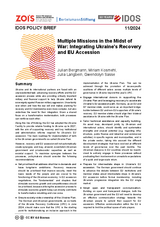Policy Brief
Multiple missions in the midst of war: integrating Ukraine's recovery and EU accession
Bergmann, Julian / Miriam Kosmehl / Julia Langbein / Gwendolyn SassePolicy Brief (11/2024)
Bonn: German Institute of Development and Sustainability (IDOS)
DOI: https://doi.org/10.23661/ipb11.2024
Українське видання:
Кілька місій у розпал війни: інтеграція зусиль з відновлення та вступу України до ЄС
(Policy Brief 14/2024)
Dt. Ausg. u.d.T.:
Eine komplexe Aufgabe inmitten des Krieges: Wiederaufbau und EU-Integration der Ukraine miteinander verzahnen
(Policy Brief 16/2024)
Ukraine and its international partners are faced with an unprecedented task: advancing recovery efforts and the EU accession process while also providing critically important military and financial support to help Ukraine defend its sovereignty against Russian military aggression. Uncertainty over when and how the war will end makes planning for recovery and EU membership even more complex, but also underlines the need for their integration. Given a shared focus on a transformative modernisation, both processes can reinforce each other.
Along this line of thinking, the EU has adopted the Ukraine Facility to provide reliable funding to Ukraine up to 2027, with the aim of supporting recovery and key institutional and administrative reforms required for Ukraine’s EU accession. The main roadmap for implementation of both is the Ukrainian government’s so-called Ukraine Plan. However, recovery and EU accession will not automatically create synergies, and may, at worst, overstretch Ukrainian government and private-sector capacities as well as societal support. To maximise synergies between the processes, policymakers should consider the following recommendations:
● Set priorities that address short-term demands and have long-term ambitions. Recovery measures should be prioritised that improve security, meet the basic needs of the people and are crucial to the functioning of the Ukrainian economy. In EU accession negotiations, the “fundamentals” and chapters that stimulate economic growth and competitiveness should be prioritised, because utilising the accession process to stimulate economic growth today can directly contribute to transformative rebuilding and vice versa.
● Ensure society-wide ownership of the Ukraine Plan. The German and Ukrainian governments, as co-hosts of the Ukraine Recovery Conference (URC) in June 2024, should make sure that the URC is the starting point for institutionalising an inclusive approach in the
implementation of the Ukraine Plan. This can be achieved through the promotion of issue-specific coalitions of different actors across multiple levels of governance in Ukraine beyond this year’s URC.
● Engage international donors in supporting the Ukraine Plan and leveraging recovery to accelerate Ukraine’s EU accession path. Germany, as an EU and G7 member state, could serve as an important bridge-builder between EU and non-EU supporters of Ukraine’s recovery. EU member states should align their bilateral assistance to Ukraine with the Ukraine Plan.
● Tailor technical assistance and capacity building. An asset map, developed jointly by Ukrainian and international actors, should identify and systematise strengths and unused potential (e.g. regarding infrastructure, public finance and industrial and commercial activities) in specific regions and municipalities, and in the private sector, taking into account the different development strategies that have evolved at different levels of governance over the past months. The Ukrainian diaspora in EU countries should be incentivised to actively engage in these processes without predicating their involvement on unrealistic expectations of a quick and large-scale return.
● Prepare for intermediate steps in Ukraine’s EU accession. The German government should continue to advance the debate between EU institutions and member states about intermediate steps in Ukraine’s EU accession before formal membership, including Ukraine’s progressive integration into the EU single market.
● Adopt open and transparent communication. Building on open and transparent dialogue, both the Ukrainian government and the EU will need to develop an effective communication strategy towards the Ukrainian people to uphold their support for EU accession. Effective communication within the EU is required to limit the political space of veto players.
Contact
Cornelia Hornschild
Publication Coordinator
E-mail Cornelia.Hornschild@idos-research.de
Phone +49 (0)228 94927-135
Fax +49 (0)228 94927-130
Alexandra Fante
Librarian/ Open Access Coordinator
E-Mail Alexandra.Fante@idos-research.de
Telefon +49 (0)228 94927-321
Fax +49 (0)228 94927-130




![[Translate to English:] Photo: Alexandra Fante, Bibliothekarin/Open Access-Koordinatorin](/fileadmin/_processed_/f/0/csm__c_Deutsches-Institut-fuer-Entwicklungspolitik_Fante_94ce4fa1ba.jpg)